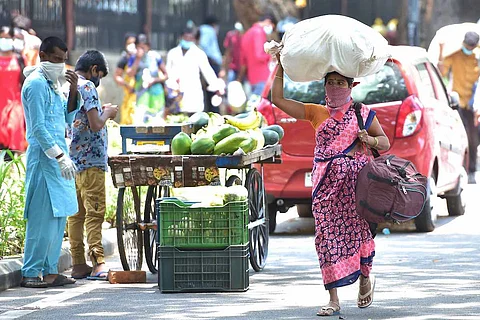

As Bengaluru’s migrant workers continue to face lack of food and shelter, activists blame the inadequate response to the mass crisis on inefficient ground-level governance.
According to a High Court order, the Bruhat Bengaluru Mahanagara Palike (BBMP) is supposed to constitute a Disaster Management Cell (DMC) in every ward to effectively respond to any disaster. This, however, has not been done after the coronavirus pandemic struck.
According to a letter from the BBMP Commissioner dated April 29, “Disaster Management Cells are established in all the 198 wards under the chairmanship of the respective ward Corporators in the BBMP limits. These DMCs shall on a regular basis identify problem areas and provide effective solutions for time-bound implementation of plans/decisions/policies issued by me (BBMP Commissioner) and the state government in their respective wards.”
The Commissioner also outlined the role that these DMCs are to play: “The DMCs will thus take co-ordinated steps to combat the pandemic including effective implementation of lockdown, identification of migrant labourers, the destitute and the poor. It shall help in providing them with necessary facilities such as: cooked meals, ration kit, milk, shelter, medical facilities, etc.”
More than two weeks after the Commissioner’s directive, the DMCs are yet to become a reality in many of Bengaluru’s wards.
Narendra Kumar, a resident of BBMP Ward number 11, Kuvempu Nagar, says that the DMCs have not been implemented in his ward.
“I have kept following up with the Corporator and the engineer to establish the DMC. They need to get local government officials like government school teachers so that relief can begin. They only keep saying that they will do it, but there has been no real action,” he says.
The story is similar in most Bengaluru wards.
Activist Kathyayini Chamaraj, who engages with issues of public interest, says because the DMCs have not been activated, it has led to a centralisation of resources with the Labour department and the BBMP, and materials have not adequately reached the needy.
“In the absence of these disaster management cells at the local level, various individuals, NGOs and the local MLAs are trying to help, but it is inadequate. The Labour department has also provided 5,000 ration kits to MLAs to distribute in their constituencies,” Kathyayini says.
“When it comes to the MLAs, there are various problems such as discrimination – against people who are not locals, or according to the people’s religion, language and state. It has also been quite ad hoc and partisan, with no transparency. We have heard cases where the MLA has denied ration kits to certain people because they didn’t vote for him. This system doesn’t work, and Ward Committees need to step into the role of disaster management cells,” she adds.
Kathyayani says that the same is not the case in neighbouring Kerala. The state has been able to activate the ward committee’s disaster management cells.
“It is because of these local groups that Kerala has responded extremely quickly to the crisis faced by migrant workers,” she says.
Prabha Dev, another activist from Bengaluru, says, “DMCs have to become a reality for controlling the fallout from the pandemic. The easiest way to keep track and monitor (the pandemic is) at the smallest unit of governance.”